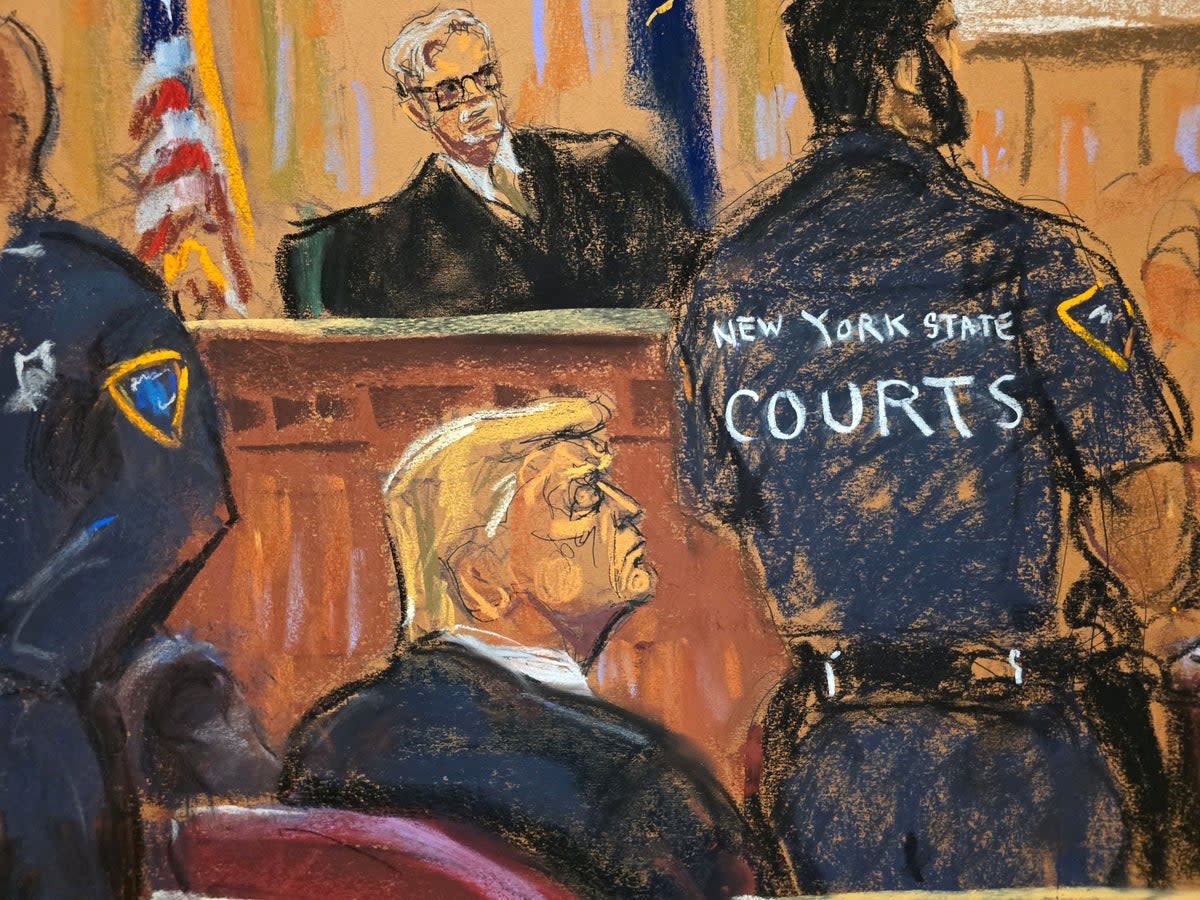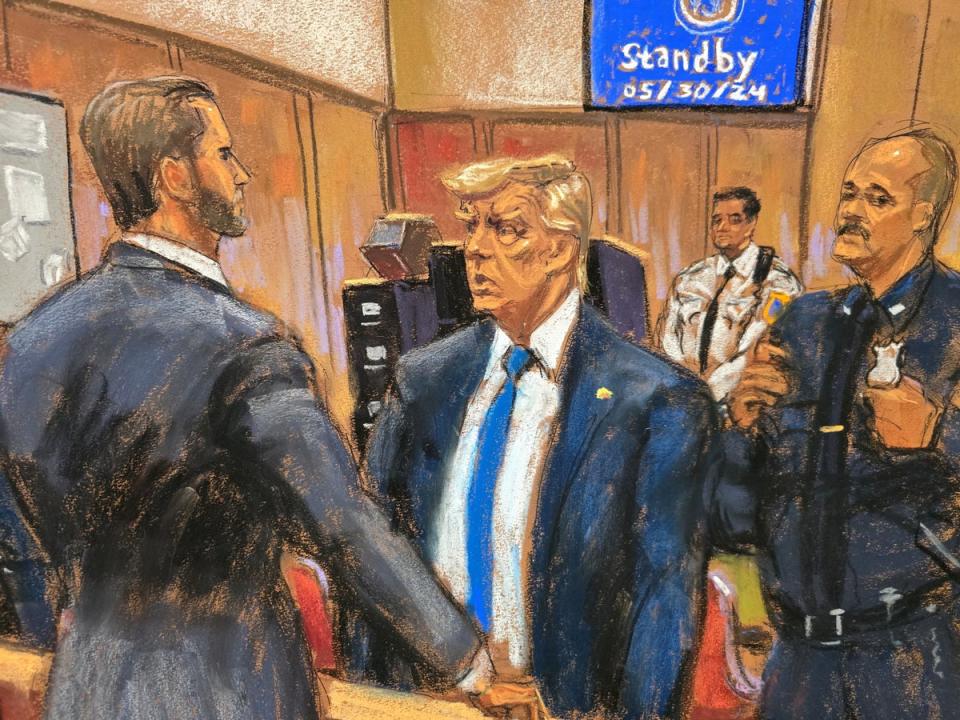Inside the courtroom the moment Donald Trump became a convicted felon

On the 23rd day of his criminal trial, on the 15th floor of a Manhattan courtroom, defendant Donald Trump was found guilty of all 34 counts against him.
One hour before a juror quietly announced “guilty” 34 times, the former president was laughing with his attorneys, preparing to pack up for the day and return the next morning.
Shortly after 5pm on May 30, the Republican nominee for president became a convicted criminal, accused of falsifiying business records as part of an election conspricacy that involved covering up payments to an adult film star whose story of an affair threatened to derail his 2016 presidential campaign.
Prosecutors with the Manhattan District Attorney’s Office had walked into the courtroom at 4.09pm.
Moments later, Trump entered the hallway, where police barricades penned in a handful of photographers and print reporters who could capture his movements.
“Mr Trump, are you nervous about a verdict?” a reporter asked.
He briefly stopped, turned to the cameras and said: “I want to campaign.”
In an adjoining courtroom where roughly 100 reporters could watch a closed-circuit broadcast of the proceedings on three large flat screen TVs, Trump – in a blue satin tie – could be seen at the defense table between his attorneys Todd Blanche, on his right, and Emil Bove, to his left. Trump’s son, Eric, sat in the first row behind him.
Two minutes later, New York Justice Juan Merchan returned to the bench.
He announced his plans to excuse the jury at 4.30pm. Heavy sighs filled the overflow room.
Trump immediately swatted Blanche’s arm with a smile and whispered in his ear. Blanche jumped up to speak with Assistant District Attorney Joshua Steinglass, who was huddled with his team at the prosecution’s table. Blanche returned to his seat, and Trump told him something that made him nearly double over with laughter. Trump smiled.
After roughly nine hours of deliberations, it appeared the jury had not reached a verdict, and would return in the morning.
Judge Merchan sent an officer to knock on their door, to summon them back to the courtroom to be excused.
Reporters prepared to shut their laptops and bolt for the courtroom’s double swing doors to beat a rush to the elevators.
Judge Merchan returned to the courtroom at 4.36pm.
He held a note from the jury that had been signed at 4.20pm. “We the jury have a verdict.”
Trump’s body language immediately shifted. His shoulders tensed. He crossed his arms. His attorneys stared straight ahead, stone-faced.
The note continued: “We would like an extra 30 minutes to fill out the form. Would that be possible?”
Merchan issued a brief warning.
“I’m sure you will hear from the sergeant and the major and everyone else, but please let there be no outbursts of any kind when we take a verdict,” he told the court. “I’ll be back out in a few minutes.”
A court officer in the overflow loudly announced that we must “keep the outbursts to a minimum.”
The overflow room fell silent, punctured by occasional static from court officers’ radios, their footsteps as they paced the room, and a cascade of keyboards clacking to capture the moment.
Trump uncrossed his arms and kept them to his side, closed his eyes and tilted his head up slightly. He sat at the defense table in that position for most of the trial’s seven weeks.
Manhattan District Attorney Alvin Bragg entered the courtroom and took a seat in one of the pew-like rows behind the assistant district attorneys leading the case.
Judge Merchan returned to the bench roughly 20 minutes after he announced that a verdict had been reached.
“Bring out the jury, please,” he said. A court officer called out “all rise.”
As the 12 jurors entered the room at 5pm, the screens in the overflow room went dark, keeping their movement out of view of the closed-circuit broadcast.
“Has the jury in fact reached a verdict?” Merchan asked, pivoting to the foreperson in the first seat.
The foreperson, Juror 1, said yes.
A court clerk asked him 34 questions.
“How say you to the first count of the indictment, charging Donald J Trump with falsifying business records in the first degree?” she asked.
The foreperson, his voice quiet and steady, announced the first of 34 answers:
“Guilty.”
The room filled with a few deep breaths and sharp sounds of fingers frantically hitting laptops.
To count two?
“Guilty.”
To count three?
“Guilty.”
Thirty-one more questions, and 31 more answers, delivered at a brisk pace.
Trump sat motionless, his lips tightly closed, his gaze ahead of him at nothing in particular.
Bove, who sat expressionless through most of the trial, gently shook his head.
Blanche, the former president’s lead attorney, sat forward with his elbows on the table and his head in his hands.

When the foreperson was finished, each member of the jury was asked to confirm their decision, one by one.
Trump craned his head towards the jury box, narrowing his gaze, and remaining silent without any visible signs of emotion as all 12 jurors said yes.
From the overflow room and the adjoining hallway, cheers from a growing crowd in the park across the street could be heard 15 floors below.
Merchan thanked the jurors at 5.11pm. He noted the trial’s seven-week timeline, and the nearly 200 hours spent inside the courthouse.
“That’s a long time,” away from jobs, families, and other responsibilities, for “a stressful and difficult task,” he said.
He admired “your dedication, your hard work,” and said he could “see how involved, how engaged you were.”
They “gave the attention this matter deserves,” he said.
Judge Merchan also noted that they do not have to speak to anyone about their decision. “No one can make you do anything you don’t want to do,” he said. “The choice is yours.”
He said he would meet with them personally to thank them and for their feedback. The jurors were then excused.
Blanche quietly requested a long-shot motion to dismiss the verdict. The judge denied it within seconds.
Within minutes, Judge Merchan scheduled Trump’s sentencing for July 11 at 10am.
“What is the current bail status?” he asked the prosecution. Steinglass said there is none.
Trump will remain “ROR’d,” - released on his own recognizance - prior to sentencing, Judge Merchan said.
He adjourned at 5.17pm, marking the end of the first-ever criminal trial, and first-ever criminal verdict, of an American president.
Court officers shouted out “clear the courtroom” seconds later.
More than a year after he was indicted, and after hundreds of hours of investigations, trial testimony, arguments and deliberations, Trump’s conviction took only minutes.


